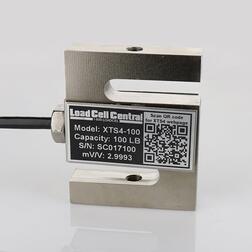S-Type Load Cells: Versatile Solutions for Tension and Compression Measurement
July 14, 2025

S-type load cells, easily recognized by their distinctive “S” shape, are valued for their ability to measure both tension and compression forces with exceptional precision. These sensors convert mechanical force into an electrical signal, making them essential for accurate force and weight measurement in industries such as manufacturing, automotive, healthcare, and agriculture. Their compact form, rugged design, and dual functionality make them ideal for applications where reliability and precision are critical.
This article explores common S-type load cell applications and offers practical insights for effectively integrating this technology across a variety of measurement needs. Whether you’re implementing S-type load cells in industrial, laboratory, or field settings, understanding proper installation and use is key to achieving consistent, high-quality results.
What Is an S-Type Load Cell?
An S-type load cell is a force sensor designed to measure both tension and compression loads. Named for its distinctive S-shaped profile, it allows force to be applied at opposite ends—making it particularly effective for tension-based applications such as hoisting, weighing, and materials testing. Inside the sensor, strain gauges detect minute deformations caused by applied force and convert them into a proportional electrical output.
The appeal of the S-type design lies in its versatility. Its symmetrical shape supports both in-line and suspended mounting, enabling easy integration even in installations with limited space or specific orientation needs. Constructed from durable materials such as stainless steel or high-strength alloy steel, S-type load cells offer excellent corrosion resistance and long-term performance in demanding environments.
Common Applications of S-Type Load Cells
Structural Performance Testing
S-type load cells are widely used in structural and component testing, particularly in the automotive industry. Engineers use them to measure forces on components like doors, hoods, and tailgates during operational tests. By accurately recording the forces required to move these parts, S-type sensors help verify structural integrity and performance under real-world conditions.
Automotive Component Lifecycle Testing
Automotive manufacturers depend on S-type load cells to evaluate the durability of key components. These sensors monitor forces during repetitive actions—such as suspension cycling, seat movement, or latch operation—to assess material fatigue and mechanical wear. Their precision in measuring repeated stress makes them indispensable for predicting maintenance intervals and estimating component lifespan.
Material Strain and Stress Testing
In research and development environments, S-type load cells are used to test material strength and flexibility across industries like construction and aerospace. By measuring the forces applied to test samples—such as metals, polymers, or elastomers—these sensors provide reliable data on tensile strength, yield points, and deformation characteristics. This information supports product development and ensures compliance with quality and safety standards.
Industrial Automation and Feedback Systems
S-type load cells are integral to modern industrial control systems. In automated batching, filling, and weighing operations, they deliver continuous feedback that allows controllers to maintain precise material quantities. Accurate, real-time measurement enhances both process efficiency and product consistency—key benefits in sectors such as food processing, packaging, and manufacturing.
Weighing Applications: Tanks, Silos, and Hoppers
S-type load cells are commonly installed beneath tanks, silos, or hoppers to measure bulk material weight. This setup enables accurate inventory management, prevents overfilling, and ensures consistent flow control. Their durability and precision make them ideal for large-scale weighing in industries such as agriculture, pharmaceuticals, and chemical processing.
Maximize Accuracy and Efficiency with S-Type Load Cells
S-type load cells are versatile tools for precise force and weight measurement across a wide range of applications—from automotive testing to process automation and bulk material handling. To ensure optimal accuracy and longevity, proper mounting, calibration, and maintenance are essential.
For expert support with S-type load cell selection, installation, or calibration, contact Load Cell Central today.